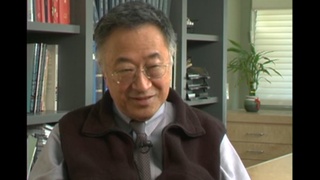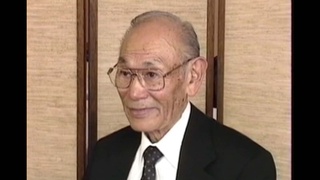Interviews
Influence of Mexican culture after returning from camp
You know, it’s interesting because when we first came back from Camp, we actually got, we got discriminated against by the Mexican-Americans—when we came back, everybody didn't like the Japanese—and they didn’t like us either. We came back and there was actually a lot of hostility from alls circles. I think what started opening people up was that my parents started attending the local church, the local Catholic Church, everyone in that community was Catholic. And my mom, shall we say, my mom turned Mexican during that community, she fell in love with the Mexican culture, language, food, everything, and so she was the toast of the neighborhood. She was amazingly fluent in Spanish and practiced every day. She made it a point of going to movies and so in terms of Mexican American culture.
I always thought to some extent it was influenced to some extent too, by my oldest brother Steve, because what had happened when we came to Orange County was that my oldest brothers were in school. So they started going back and forth to school they used get beat up every day by the White kids. At some point, the Mexican kids got tired of watching them get beat up and started jumping in for them and it...and I think it affected the way we grew up because our family was very close to the Mexican Americans because they stood up us, there was like nobody else would, you know. But anyways, we moved out of there shortly thereafter we went to East LA but I thought that cultural sort of immersion was capable, was possible because of that, that support at a time again when you know, Japanese Americans were very unpopular. We didn’t have a lot of support any place when somebody would jump in for us that meant something, that and it’s just like that today. You know, when somebody wants to pile onto the unpopular minority or the targeted individual whoever that is any given time everybody wants to pile on for that person and it becomes a popular sport for people who have got a sadistic streak. So anybody that would defend people in that situation they are in my heart.
Date: July 14, 2020
Location: California, US
Interviewer: Matthew Saito
Contributed by: Watase Media Arts Center, Japanese American National Museum; Japanese American Bar Association
Explore More Videos



Lack of political power led to camps
(1924-2018) Researcher, Activist

Choice to move east or go to Japan
(b.1920) Japanese Canadian Nisei. Established the Ikenobo Ikebana Society of Toronto


Institutionalization as a bad aspect of camp
(1924-2018) Researcher, Activist

State Department records show concern for treatment of Japanese American internees
(1924-2018) Researcher, Activist

Different tension between East Coast and Los Angeles
Japanese American Creative designer living in Japan

The Kona Island community
(1923-2011) Lawyer, MIS veteran, founder of Francis and Sarah Sogi Foundation

Remembering December 7, 1941
(1923-2011) Lawyer, MIS veteran, founder of Francis and Sarah Sogi Foundation

Meeting Japanese Americans from the mainland in MIS
(1923-2011) Lawyer, MIS veteran, founder of Francis and Sarah Sogi Foundation


Awareness of concentration camps as a Japanese American
(1923-2011) Lawyer, MIS veteran, founder of Francis and Sarah Sogi Foundation

His experiences in Chicago after WWII
(b.1929) Pioneer medical researcher in tissue transfer and organ transplantation.

Manhunt
(1919 - 2005) Challenged the constitutionality of Executive Order 9066.
